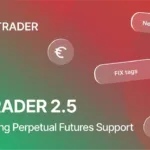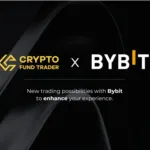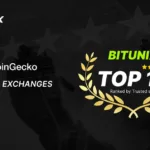Crypto perpetual futures are booming as traders seek leverage, tight spreads, and advanced tools for speculation and hedging. Selecting the best exchange with deep liquidity, low fees, and robust trading infrastructure is key to maximizing profitability and managing risk.
This guide ranks the seven best perpetual futures exchanges of 2025 based on trading volume, fee structures, leverage limits, and trading features. Whether prioritizing liquidity, high leverage, decentralized trading, or altcoin exposure, this overview will help identify the ideal platform for your trading style.
1. Bybit
Bybit, founded in 2018 by Ben Zhou, is the leading perpetual futures exchange known for deep liquidity, tight spreads, and advanced trading features. Traders have access to over 500 perpetual contracts, 1,700+ spot markets, and up to 100x leverage via a unified margin system supporting both coin-margined and stablecoin-settled (USDT/USDC) contracts.
Maker fees start at 0.02%, with taker fees from 0.055%, both decreasing further for higher VIP tiers. Deposits are supported in 65 fiat currencies via bank transfers, credit cards, PayPal, Google Pay, and Apple Pay.
Bybit maintains robust security through Proof-of-Reserves audits, cold storage, multi-signature wallets, and continuous penetration testing. It is regulated by VARA (Dubai), VASP (Georgia), ASFA (Kazakhstan), and recently secured a MiCA license in Austria, ensuring compliance within the EU market.
Bybit Key Features:
- Fees: Maker fees from 0.02%, Taker fees from 0.055% (reduced for VIP traders)
- Supported Assets: 500+ perpetual contracts, 1,700+ spot pairs
- Deposit Methods: Bank transfers, credit/debit cards, PayPal, Google Pay, Apple Pay
- Leverage: Up to 100x leverage (depending on asset liquidity and market cap)
2. Binance
Founded by Changpeng Zhao in 2017, Binance is the largest crypto futures exchange by daily trading volume, handling over $65 billion. The platform offers more than 250 perpetual contracts, including USDⓈ-margined (USDT/USDC) and coin-margined markets, with leverage up to 25x. Traders benefit from deep liquidity, competitive spreads, and risk controls such as Auto-Deleveraging (ADL).
Fees start at 0.02% (maker) and 0.05% (taker), with discounts available through higher volume or holding Binance Coin (BNB). Deposits are accepted via bank transfers, crypto, credit/debit cards, and payment providers like WeChat Pay.
Binance holds licenses globally, including AMF (France), VARA (Dubai), and AUSTRAC (Australia). It ensures user protection with regular Proof-of-Reserves audits, multi-factor authentication, encrypted user data storage, and offline cold wallet custody.
Binance Key Features:
- Fees: Maker 0.02%, Taker 0.05%; further discounts with higher volume and BNB usage
- Supported Assets: 250+ perpetual futures contracts, 300+ spot trading pairs
- Deposit Methods: Bank transfers, credit/debit cards, crypto deposits, WeChat Pay
- Leverage: Up to 25x leverage on all futures contracts
3. MEXC
Founded in 2018 by John Chen, MEXC offers perpetual futures with industry-leading leverage up to 300x across USDT-margined and coin-margined contracts. Supporting over 600 perpetual trading pairs and daily volumes exceeding $4 billion, it provides extensive liquidity, tight spreads, and access to niche crypto markets.
MEXC’s competitive fee structure includes zero maker fees and 0.02% taker fees, with substantial discounts available for users holding MX tokens or achieving high-volume trading. The Copy Trading feature, with over $1 billion traded and 2 million executed transactions, enables beginners to replicate top traders’ strategies easily.
Although MEXC uses robust security methods like cold storage, insurance funds, and proof-of-reserves exceeding 100%, it lacks formal regulatory oversight. Traders should carefully assess these regulatory factors when considering MEXC.
MEXC Key Features:
- Fees: Maker 0.00%, Taker 0.02% (further discounts with MX tokens and volume)
- Supported Assets: 600+ perpetual futures pairs
- Deposit Methods: Bank transfers, cards, crypto deposits, Google Pay, Apple Pay
- Leverage: Up to 300x leverage
4. Gate.io
Founded by Lin Han in 2013 and rebranded in 2017, Gate.io is the leading futures exchange for altcoin perpetuals, hosting over 700 trading pairs and $10 billion in daily volumes. The platform provides traders rapid access to emerging cryptocurrencies, including niche sectors like AI, meme tokens, and new Layer 1 blockchains such as Hyperliquid and Sui.
Gate.io offers advanced tools like Iceberg, TWAP orders, automated trading bots, and copy trading, allowing users to replicate proven strategies. It supports leverage up to 125x and employs high-speed matching engines to ensure reliable execution during market volatility.
While licensed in jurisdictions including Malta (VFA), Italy (OAM), and Dubai (DMCC), Gate.io operates offshore, restricting access in heavily regulated regions like the US, UK, and Canada. It employs robust security measures like multi-signature cold storage, MPC encryption, ISO 27001 certification, and regular Proof-of-Reserves audits.
Gate IO Key Features:
- Fees: Maker 0.02%, Taker 0.05%; lower fees with increased trading volumes
- Supported Assets: 700+ perpetual futures pairs, extensive altcoin selection
- Deposit Methods: Bank transfers, cards, crypto (via Web3 wallets like MetaMask)
- Leverage: Up to 125x leverage
5. OKX
Founded in 2017 by Star Xu, OKX is a leading futures exchange tailored for advanced traders, offering perpetual swaps, quarterly contracts, and over 300 supported cryptocurrencies. With daily volumes boosted by deep liquidity, traders benefit from tight spreads, reliable execution, and leverage up to 125x.
OKX employs a competitive fee structure with maker fees from 0.02% and taker fees at 0.05%, which decrease at higher trading volumes and VIP tiers. It supports advanced order types including stop-limit, trailing stop, and trigger orders, as well as automated trading bots and copy-trading functionalities.
Licensed globally, including VARA (UAE), MAS (Singapore), and MiCA (Europe), OKX prioritizes security through regular Proof-of-Reserves audits using zk-STARK technology, cold storage, multi-signature wallets, and strict multi-factor authentication.
OKX Key Features:
- Fees: Maker 0.02%, Taker 0.05%; lower fees at VIP levels
- Assets: 300+ perpetual futures contracts
- Deposits: Bank transfers, credit/debit cards (Visa, Mastercard), P2P payments (Revolut, Wise, FasterPay)
- Leverage: Up to 125x leverage
6. Blofin
Founded in 2019 by Matt Hu, Blofin is the top choice for no-KYC perpetual futures trading, appealing to privacy-focused users. The platform provides anonymous access to futures markets with leverage up to 150x, supporting over 450 cryptocurrencies and daily no-KYC withdrawals of up to $20,000.
Blofin’s fee structure is attractive for active traders, featuring maker fees of 0.02% and taker fees of 0.06%. It also offers extensive trading tools, including automated bots, copy trading, staking products, and a demo trading mode ideal for new users.
Security protocols include 1:1 proof-of-reserves, 2FA, asset segregation, and partnerships with trusted providers like Fireblocks and Chainalysis. Blofin supports deposits from 85 fiat currencies via bank transfers, credit/debit cards, PayPal, Apple Pay, and Google Pay, though it remains unavailable in certain jurisdictions.
Blofin Key Features:
- Fees: Maker 0.02%, Taker 0.06%
- Supported Assets: 450+ perpetual contracts
- Deposit Methods: Bank transfers, credit/debit cards, crypto transfers, PayPal, Wise, Apple Pay, Google Pay
- Leverage: Up to 150x leverage (no KYC required)
7. Bitget
Bitget, founded in 2018 and based in Seychelles, offers a balanced perpetual futures platform with over 200 supported cryptocurrencies and leverage up to 125x. It’s particularly notable for its copy trading feature, enabling users to effortlessly replicate strategies from experienced traders, making the platform attractive for beginners and passive investors.
Maker fees start at 0.02% and taker fees at 0.06%, decreasing significantly with higher trading volumes and VIP status. Bitget also incentivizes trading through its native BGB token, which provides discounted fees and exclusive user perks.
Licensed globally, including in the USA (MSB), Italy (OAM), and Lithuania, Bitget maintains robust security via cold storage, an insurance fund, regular Proof-of-Reserves disclosures, two-factor authentication, and anti-phishing protections. Deposits are supported via bank transfers, crypto transfers, and credit/debit cards.
Bitget Key Features:
- Fees: Maker 0.02%, Taker 0.06%; lower at higher VIP tiers
- Supported Assets: 200+ perpetual futures contracts
- Deposit Methods: Bank transfers, crypto deposits, credit/debit cards
- Leverage: Up to 125x leverage
What are Crypto Futures and Perpetual Contracts?
Crypto futures let traders speculate on or hedge cryptocurrency price movements. Standard futures expire on set dates, requiring settlement or rollover. Perpetual futures, first introduced by Hong Kong’s Chinese Gold and Silver Exchange Society in the late 1980s and formalized by Robert Shiller in 1993, have no expiry date, enabling traders to hold positions indefinitely.
Perpetual contracts closely track spot prices through funding fees, regular payments from traders holding positions above spot prices to those below. This mechanism ensures price accuracy and supports leveraged trading without expiry costs.
Originally used for commodities and currencies, perpetual futures became dominant in crypto markets by the late 2010s. They now handle trillions in annual volume, serving as critical tools for traders managing risk and market exposure.
Perpetual Contract Trading Fees
Perpetual futures traders pay two primary fees: Funding Fees and Transaction Fees. Both maintain price alignment with spot markets and affect trading costs.
Funding Fees
Funding fees are regular payments between traders holding long and short positions. If perpetual prices exceed spot, longs pay shorts, and vice versa. Fees equal the funding rate multiplied by position size, typically charged every 8 hours on centralized exchanges and hourly on decentralized platforms. Rates are usually shown annualized (e.g., 0.01% per 8 hours equals about 10.95% annually).
Transaction Fees
Transaction fees apply when traders open or close positions. Exchanges typically charge between 0.02% and 0.06% per trade, with discounts for high-volume users. These fees directly impact profitability and trading costs.
Is Crypto Futures Trading Legal?
Crypto futures trading is legal and regulated in many jurisdictions globally, including the United States, the European Union, and various regions in Asia. In the U.S., crypto futures are regulated by the Commodity Futures Trading Commission (CFTC), which ensures market transparency and investor protection.
However, some countries restrict or ban retail access to crypto futures due to volatility risks and consumer protection issues. In these regions, traders may still access decentralized exchanges operating fully on-chain without traditional identity verification requirements. Users should verify their local laws before trading cryptocurrency futures.
Tips for Crypto Perpetual Futures Traders
Successful crypto futures traders rely heavily on data-driven strategies. Using perpetuals analytics platforms like Coinperps and Coinglass provides essential market insights, including real-time funding rates, open interest, liquidation data, and heatmaps.
Monitoring funding rates helps traders gauge market sentiment and potential price shifts, while open interest reveals overall market participation. Liquidation data and heatmaps highlight areas of high-risk, enabling traders to anticipate volatility and avoid crowded trades.
Actively incorporating these tools into trading routines significantly improves decision-making and profitability.
Summary Crypto Futures Comparison Table
| Exchange | Trading Fees (Maker/Taker) | Notable Perks | Typical Users |
| Bybit | 0.02% / 0.055% | Deep liquidity, unified margin, advanced orders | Active traders, institutions |
| Binance | 0.02% / 0.05% | Highest volumes, global licenses, portfolio margin | High-volume traders, institutions |
| MEXC | 0.00% / 0.02% | Highest leverage (300x), copy trading, broad assets | Leverage-focused traders |
| Gate.io | 0.02% / 0.05% | Extensive altcoin futures, quick listings | Altcoin speculators, early entrants |
| OKX | 0.02% / 0.05% | Advanced trading tools, high liquidity, transparent reserves | Professional traders |
| Blofin | 0.02% / 0.06% | No KYC, high leverage (150x), diverse deposit methods | Privacy-focused traders |
| Bitget | 0.02% / 0.06% | Copy trading, intuitive interface, robust security | Beginners, strategy followers |
Final Thoughts
Selecting a crypto futures exchange in 2025 is about matching platform strengths with your trading objectives.
Bybit and Binance deliver top liquidity and low spreads, while MEXC and Gate.io attract traders seeking higher leverage or niche altcoins. Blofin appeals to privacy-focused traders through its no-KYC policy, and Bitget provides easy copy trading for beginners.
Consider your trading style, risk appetite, and goals carefully to choose an exchange that enhances profitability and aligns closely with your strategy.

















